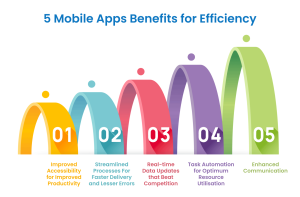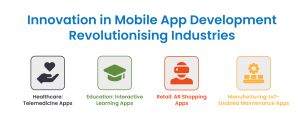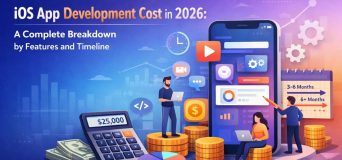
Here’s what you will learn:
The IBM Institute for Business Value found that 84% of CIOs rate mobile solutions as a critical investment.
Further, as per Constellation Research, which surveyed over 500 organisations, over 80 percent of the surveyed organisations recognise the impact of mobile business transformation. In fact, they have created dedicated teams to work on solutions.
Time and again, renowned and the most trusted sources across industries have acknowledged the significance of mobile apps for business transformation.
While anytime, anywhere access to colleagues and business data and information has a fast paced operation with significantly high efficiency, mobile apps have also created ample room for businesses to innovate in their line of business (LOB) and revolutionise their operations altogether.
Therefore, they are not only competing more aggressively but also engaging customers like never before.
However, the sad reality is that, despite smartphones being in existence for around two decades, businesses have still not utilised their true power. That is why, in this blog, we will discuss the various ways mobile applications development company bring efficiency and innovation to your business and share real-world examples for complete understanding.
Table of Contents
Mobile Apps for Business Efficiency
Streamlining Processes through Mobile App Integration
Mobile applications play a pivotal role when it comes to streamlining business processes. They provide seamless connections between various systems, processes, tools and departments.
Thereby enhancinng This integration enhances efficiency by allowing data flow across different departments for better than ever collaboration and crystal-clear communication. All the while reducing manual efforts and minimising the chances of errors.
For example, if you choose to integrate your Customer Relationship Management (CRM) Company system with a mobile sales app, it will provide the sales teams with real-time access to critical customer information such as
- Customer feedback,
- Customers’ purchase history and their preferences,
- Up-to-date information on stock levels.
Thereby, it leads to more informed decisions and improves overall sales performance with a more cohesive and agile organisational structure.
Enhancing Communication and Collaboration within Teams
Mobile apps serve as a lynchpin when it comes to enhancing communication and collaboration within and among teams. This is even more relevant in a modern, dispersed work environment with remote working options.
Mobile applications offer multiple features that contribute to this direction, such as:
- Instant messaging and sharing of files
- Collaborative document editing, wherein multiple users can access and work on a single document
- Project management efforts such as creation, assignment, and tracking of tasks collaboratively.
- Video-conferencing for face-to-face communication enhances remote collaboration.
- Shared calendars
And this is not an all-exhaustive list, as the features are literally endless, innovated and customised as per the specific business requirements.
They facilitate real-time collaboration and break down communication barriers, whether your team members are in the office or working remotely.
The faster and more efficient information exchange results in quicker and better-informed decisions than ever possible and a more connected and responsive workforce.
Improved Efficiency for Business through Mobile Apps
Mobile apps have the capability to deliver tangible benefits when it comes to business efficiency. There are numerous ways in which businesses in different industries are incorporating mobile applications to gain an edge. Here are some of the real-world examples:
Logistics
Logistics companies use mobile apps for real-time tracking of their fleet and optimising delivery routes to save time and money.
Field Service Management (FSM)
Businesses with field service teams can help them access maintenance schedules and update work orders on the go, thereby minimising downtime and ensuring faster services to win customer trust and build brand loyalty.
Healthcare
Healthcare providers are using mobile apps to manage patient records, appointment scheduling, and medication tracking. Along with that, doctors and nurses access patient information in real-time for enhanced care coordination and reduced administrative delays.
Retail
Retailers are using mobile apps to track inventory in real-time and manage orders. With they accurately maintain Grocery App Development stock levels and improve overall supply chain efficiency.
Construction
Construction teams are leveraging mobile apps for project planning, collaboration, and tracking. Project managers update timelines, assign tasks, and share blueprints in real-time for streamlined construction processes.
In a nutshell: 5 Mobile Apps Benefits for Efficiency
Mobile apps help your employees get instant access to information from anywhere at anytime, thereby enabling them to work as per their convenience and enhancing overall productivity.
Integration of mobile apps with your business systems streamlines processes, thereby reducing manual efforts and minimising delays and errors in monotonous tasks such as data entry, approval workflows, and order processing.
Mobile apps facilitate real-time data synchronisation. This ensures that your employees stay up-to-date with access to the most current information. This is crucial for decision-making and beating competition
You can even automate your business operations with mobile apps. They streamline repetitive tasks to free up your employees. Thus, they can focus on more strategic activities that bring greater value to the organisation.
As we have already covered in the above section, mobile apps facilitate seamless communication within your teams. This allows quick information sharing, collaboration, and decision-making, regardless of physical location. |
Foster Innovation With Novel Mobile app Development trends
Agile and Flexible Work Environments
Mobile apps enable agile and flexible work environments with innovative solutions that remove traditional office constraints and go beyond their four walls. It allows teams to work from anywhere, collaborate in real time and respond to dynamic market fluctuations and customer needs in real-time.
And timing is exactly what a business needs to seize opportunities, beat competitors and attain market leadership.
Such flexibility in working from anywhere results in an innovative work culture where ideas are generated and implemented at the speed of light.
Creative Problem-Solving and Idea Generation
With creative features such as brainstorming platforms, virtual whiteboards, etc., mobile apps catalyse innovative problem-solving. Such features allow teams to join forces to generate ideas and solve challenges, even if they are working from a distance.
And that’s not all; mobile apps also allow you to track the progress of your idea, create feedback loops, and ensure a continuous innovation cycle within your organisation with ideas emerging and flowing from diverse perspectives and varying flavours.
Innovation in Mobile App Development Revolutionising Industries
Strategic implementation of mobile apps has led to several demonstrable success stories driven by innovation. Here are some examples to impress you:
Healthcare: Telemedicine Apps
Mobile apps have saved hundreds of lives by facilitating remote consultations, virtual diagnosis, and prescription services. This has increased accessibility to healthcare, especially in remote or underserved areas.
Education: Interactive Learning Apps
Educational mobile apps facilitate experiential learning with features like interactive content, gamification, and personalised learning. This way, these apps promote innovative teaching methods, increase student participation, and ensure better learning outcomes.
Retail: Augmented Reality (AR) Shopping Apps
Retailers are leveraging AR mobile apps development to offer novel shopping experiences and achieve high consumer satisfaction. Customers are trying clothes virtually, envisioning furniture right in their homes, and exploring products before making a purchase. This has not only boosted sales but also reduced returns.
Manufacturing: IoT-Enabled Maintenance Apps
Integrated with advanced Internet of Things (IoT) sensors, mobile apps are helping in the predictive maintenance of manufacturing facilities. These apps monitor equipment health in real-time, detect anomalies, and schedule maintenance proactively.
Therefore, before failures occur, the machines go through fixes, which minimise downtime and prolong equipment life.
In a nutshell: 5 Ways Mobile App Bring Innovation
Mobile apps develop agile and flexible work environments by empowering employees to adapt to dynamic circumstances. With the assistance of smart applications, employees can make faster decisions in real-time to respond swiftly to market trends and customer needs.
Mobile apps provide a platform for your teams to brainstorm, share ideas, and collectively work to achieve creative problem-solving with innovative solutions.
Mobile apps enhance customer engagement through personalised experiences and solutions with features like push notifications, location-based services, and tailored content.
Mobile apps provide your business with valuable insights into user behaviour, preferences, and market trends with the help of analytics tools. Therefore, you make informed strategic decisions and lead the market.
With the iterative nature of mobile app development, you can make continuous improvements. You gather user feedback, analyse performance metrics, and release updates to stay ahead of the competition |
Success Stories with Our Mobile app development company
OrangeMantra is one of the most trusted names in the mobile app development space. Over the course of 23 years, we have delivered several app solutions that have worked wonders for our clients. Here are some of them.
Marketplace Mobile App for Panasonic
Panasonic, a reputed electronic brand across the globe, has set benchmarks in the consumer electronic industry with its constant innovation. They were on the lookout for a technology partner that could develop a mobile app integrated with customer service and mobile commerce services.
Till now, they were utilising the legacy method, which was not designed to handle changing market requirements. They wanted a new system from the ground up and required a technology partner. The partner should be able to understand their specific needs and have superlative technical expertise in building mobile apps.
OrangeMantra matched this criteria and after a few brainstorm sessions, we started with the app development. The app was to be a single-point interface for customers to interact with customer service specialists. Along with that, it had the following features:
- One-touch access: Customers can access answers and information for any query and benefit from an escalation module for speedy resolution.
- Never-before-transparency: The customer can check and extend warranty period.
- Updates & Info: Customers can access all data regarding their product bills, payments, and warranty on the go.
- Documents: Allows easy access to all documents pertaining to financial documents, warranty and installation.
- Payments: Provides customers instant access to payment options for their purchases and downloadable receipts and invoices as well.
Cross-Platform App Development for Re-Sustainability
Our client, a renowned waste management firm, was looking for a technology partner to automate their manual operations and workflow management through hybrid app development.
One of the biggest challenges was the manual documentation process for waste management, resulting in a lack of team communication, data loss and higher operational costs.
Another challenge was that they were unable to track the location of vehicles carrying solid waste to dumping yards and execute predictive maintenance on vehicles.
We designed the solution with a clear focus on the client’s expectations and requirements in each phase of the development process. With our fitting software application, they could automate data collection and predict future costs by uncovering patterns and trends in their waste management spending.
Our mobile application comprehensively covered the whole process, from waste picking, recycling and dumping. It was built for all stakeholders involved in the waste management process:
- Waste Collectors,
- Ward Manager,
- Drivers/Helpers,
- Material Recovery Manager,
- City Administration
Finally, a database was built to organise and store all the data sent by app users.
With the help of our application, all these users could successfully play their designated roles with full utilisation of various app features.
Future-ready Workspace solution for Space Matrix
Our client, Space Matrix, is one of the pioneers of smart workplace development and management. With offices in Singapore and the U.S., the company caters to India, Australia, and 80 other countries.
They had a unique idea of a mobile application that could enable users to interact with the smart workspace and manage desired actions.
Creating an application solution that can interact with all the entities of a smart workplace—such as sensors, beacons, and smart devices—and allow users to perform desired actions required complex tech integration and planning.
Our team of developers, designers, and digital experts created a unique road map for tech integration and an agile strategy for application development.
Also, it was essential to create an IoT / Beacon-enabled and integrated application that can enable employees, managers, and other users to access personalised workspace features.
Eventually, our team developed Java, Swift, and PHP-based applications for web and mobile, having several user-driven modules that are interconnected and enable visitors, employees and managers to control different aspects of the office.
The top features of applications include a
- meeting scheduler,
- employee and visitor access automation,
- parking access control automation,
- pantry services automation,
- desk and food booking,
- Indoor route finder,
- in-app communication and announcements, and many more.
The solution thrives on staggering real-time workspace data and allows users to leverage office commodities through a next-gen app solution.
Besides, our team customised beacons and IoT-integrated real-time data automation solutions to implement indoor path navigation, appliance control, parking and office access authentication for visitors, workspace service request launchers, and more.
Also, the workspace data analytics solution generates valuable insights to help employers find areas for improvement in office space.
Types of Mobile App Development: Which one to choose?
The real-world examples we shared above must have convinced you to get an application for yourself. However, before you move on to the development its basically classified in android app development company and iOS app development company , you need to have the answer to a critical question. And finding the right answer to this question is important, as it will impact your business significantly.
The question is: Which type of mobile application is best for your business?
And this is where you will find the answer to that. See, there are three types of mobile applications:
- Native Apps
- Hybrid Apps
- Progressive Web Applications
Each of these has its own positives and negatives. Let’s discuss them in detail.
Native App Development
Native apps are developed for a specific mobile platform, such as iOS or Android. They are developed using that specific platform’s native programming languages, such as Swift or Objective-C for iOS and Java or Kotlin for Android app development .
Advantages Of Choosing Native Applications
- Native apps perform extremely well due to their high-level compatibility, as they are meant for the specific platform they work on. This takes us to the second benefit: the user experience.
- Native apps offer great user experience on top of high performance. The apps face little to no downtime or glitches and deliver fast-paced results.
- Native apps have access to device-specific features and functionalities that contribute to their uniqueness.
When are native applications best for your business?
You should choose native applications under the following conditions:
- When the majority of your business audience is using a specific platform, you should go for a native application. So, if you are a brand that caters to an audience of high-income people who love exclusive offerings, go for iOS app development solutions.
- When you have sufficient time and resources, these apps tend to have higher development costs and take longer to develop.
- You can manage to maintain separate codebases for each platform.
Cross-Platform (Hybrid) App Development:
Cross-platform apps are compatible with different platforms. They use web technologies such as HTML, CSS, and JavaScript and then wrap them in a native container for deployment on their respective platforms.
Advantages of Choosing Cross-Platform Applications
- The code of hybrid application can be reused across different platforms, leading to faster development and reduced time-to-market.
- Reusability also saves time and cost on development compared to native apps, where you need to develop app from scratch.
- Also, cross-platform applications are easier to maintain with a single codebase.
When are cross-platform applications best for your business?
Choose a cross-platform application under the following conditions:
- You have room to slightly compromise on performance, as with compatibility comes compromise and cross-platform apps perform slightly lower than native apps.
- Likewise, there is limited access to certain device features so depending on your business requirements, you can navigate this aspect.
- You need to adhere to specific app store approval processes for different versions of your mobile applications.
Progressive Web Apps (PWAs):
PWAs are web applications that use modern web technologies. They offer an experience and functionality on par with native applications, with a difference. That is, they can be accessed through a web browser without users needing to download them from application stores.
Advantages of Choosing PWA Development:
- PWAs offer cross-platform compatibility, as users of any device can access them through a web browser.
- Users do not need to install them on their phones and lose valuable storage. This also increases the reach of these applications.
- PWAs have higher chance of discoverability through search engines compared to other types of applications, again contributing to their reach.
When are PWAs best for your business?
Choose PWA development under the following conditions:
- Just like we discussed in the context of cross-platform application development, PWAs are great if you need limited access to only certain device features compared to native apps.
- You do not want an application as feature-rich as native apps.
- You need wider reach and want to circumvent the steps of app store approval process.
In a nutshell: Choosing the Right Application Type for Your BusinessNative Application: For high performance and full-fledged native features.
Cross-platform Applications: For cost efficiency and faster development; PWA: For web-based and discoverable apps. |
Conclusion
There is no denying that to improve business operations and perform at their full potential, mobile apps for business are the way to go.
They are actually the gateway for businesses to use the latest technology, which brings two powerful benefits – efficiency and innovation. Both of these benefits are the engine for business growth and standing out in the market with significant leads. The real world examples we shared are testimony to that.
So, if you are looking to transform your business, there is no other way than through a mobile application. Contact a technology consultant, like OrangeMantra, and share your requirements. They will understand your requirements, analyse your business operations and share a tonne of tech-based application ideas for you too benefit from.
Frequently Asked Question
What are mobile apps for business?
Mobile apps for business are the ones that make business operations easy. They are for a B2B or B2B2C audience comprising mainly professionals as their primary users. Some of the examples are CRM applications, human resources management applications, eCommerce applications and more.
What does a mobile app development company do?
Mobile application development typically involves developing software-based applications to achieve client specific goals. It can be B2B or B2C. They have a team of expert software developers who excel in the technical skills and tools required to develop such software.
What are the benefits of Android app development?
Android application development helps you reach a wider audience, given the vast userbase of the platform. Currently, there are around 3.9 billion active users of Android smartphones across 190 countries, comprising 70% of the mobile OS market share in 2024.
What are the benefits of iOS app development solutions?
iOS app development gets you an audience that has a high conversion rate. This audience is more loyal, which is an advantage for businesses looking to monetize their apps and on the lookout for a loyal user base.






